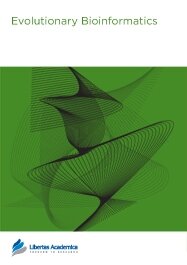

Publication Date: 18 Oct 2011
Type: Original Research
Journal: Evolutionary Bioinformatics
doi: 10.4137/EBO.S7510

A comparative analysis of 60 complete Burkholderia genomes was conducted to obtain insight in the evolutionary history behind the diversity and pathogenicity at species level. A concatenated multiprotein phyletic pattern and a dataset with Burkholderia clusters of orthologous genes (BuCOGs) were constructed. The extent of horizontal gene transfer (HGT) was assessed using a Markov based probabilistic method. A reconstruction of the gene gains and losses history shows that more than half of the Burkholderia genes families are inferred to have experienced HGT at least once during their evolution. Further analysis revealed that the number of gene gain and loss was correlated with the branch length. Genomic islands (GEIs) analysis based on evolutionary history reconstruction not only revealed that most genes in ancient GEIs were gained but also suggested that the fraction of the genome located in GEIs in the small chromosomes is higher than in the large chromosomes in Burkholderia. The mapping of coexpressed genes onto biological pathway schemes revealed that pathogenicity of Burkholderia strains is probably mainly determined by the gained genes in its ancestor. Taken together, our results strongly support that gene gain and loss especially in ancient evolutionary history play an important role in strain divergence, pathogenicity determinants of Burkholderia and GEIs formation.
PDF (661.77 KB PDF FORMAT)
RIS citation (ENDNOTE, REFERENCE MANAGER, PROCITE, REFWORKS)
Supplementary Files 1 (3.71 MB ZIP FORMAT)
BibTex citation (BIBDESK, LATEX)
XML
PMC HTML
The team at Evolutionary Bioinformatics were fantastic in everyway. They were very accessible and helped with all aspects of getting the paper published in a timely fashion. The immediate online help option available through the website is a great option.

All authors are surveyed after their articles are published. Authors are asked to rate their experience in a variety of areas, and their responses help us to monitor our performance. Presented here are their responses in some key areas. No 'poor' or 'very poor' responses were received; these are represented in the 'other' category.See Our Results
Copyright © 2013 Libertas Academica Ltd (except open access articles and accompanying metadata and supplementary files.)
FacebookGoogle+Twitter
PinterestTumblrYouTube